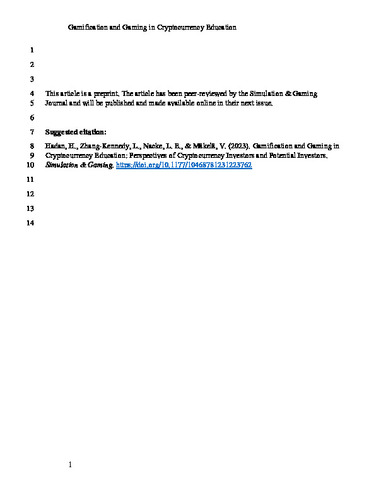| dc.contributor.author | Hadan, Hilda | |
| dc.contributor.author | Zhang-Kennedy, Leah | |
| dc.contributor.author | Nacke, Lennart | |
| dc.contributor.author | Mäkelä, Ville | |
| dc.date.accessioned | 2024-02-23 18:40:00 (GMT) | |
| dc.date.available | 2024-02-23 18:40:00 (GMT) | |
| dc.date.issued | 2024-01-22 | |
| dc.identifier.uri | https://doi.org/10.1177/10468781231223762 | |
| dc.identifier.uri | http://hdl.handle.net/10012/20367 | |
| dc.description.abstract | Introduction: In recent years, cryptocurrency has increasingly sparked interest among investors. Many people have invested in this field without adequate knowledge. Existing research has shown that using game design elements can be an effective method of education. Such learning interventions can potentially be a good match for educating market investors, as they provide risk-free simulations for novice investors to gain practical experience without having to be concerned about real financial losses. However, it is unclear how market investors perceive gamified and game-based learning interventions and whether they would adopt them for cryptocurrency education.
Research Objectives: Our study investigated market investors’ perceptions, needs and expectations regarding the integration of gamification and game-based learning interventions in cryptocurrency education.
Methodology: We conducted an online survey with n=413 participants, including experienced market investors and people who are interested in cryptocurrency. Within the survey, we presented the mock-ups of two cryptocurrency learning interventions: a gamified cryptocurrency learning application, and a cryptocurrency learning video game.
Results: From market investors’ perspectives, our study revealed the benefits and drawbacks of incorporating gamification and game design principles to facilitate learning cryptocurrency. We identified the need to develop dynamic, accessible, reliable, and community-building gamified and game-based cryptocurrency learning interventions.
Conclusion: From our findings, we propose guidance for the integration of gamification and games in cryptocurrency education, and we provide design recommendations for investor-specific cryptocurrency learning interventions. | en |
| dc.description.sponsorship | The research was supported by the Mitacs Accelerate funding program (#IT30275) for Gamified Learning about Cryptocurrency project, in partnering with Steam Exchange Inc. Any opinions, findings, and conclusions or recommendations expressed in this material are those of the authors and do not necessarily reflect the views of Mitacs, the Steam Exchange Inc, and the University of Waterloo. | en |
| dc.language.iso | en | en |
| dc.publisher | Sage | en |
| dc.relation.ispartofseries | Simulation & Gaming; | |
| dc.rights | Attribution 4.0 International | * |
| dc.rights.uri | http://creativecommons.org/licenses/by/4.0/ | * |
| dc.subject | gamification | en |
| dc.subject | game-based learning | en |
| dc.subject | cryptocurrency | en |
| dc.subject | education | en |
| dc.subject | market investor perspectives | en |
| dc.title | Gamification and Gaming in Cryptocurrency Education: A Survey with Cryptocurrency Investors and Potential Investors | en |
| dc.type | Preprint | en |
| dcterms.bibliographicCitation | Hadan, H., Zhang-Kennedy, L., Nacke, L., & Mäkelä, V. (2024). Gamification and gaming in cryptocurrency education: A survey with cryptocurrency investors and potential investors. Simulation & Gaming. https://doi.org/10.1177/10468781231223762 | en |
| uws.contributor.affiliation1 | Stratford School of Interaction Design and Business | en |
| uws.contributor.affiliation2 | Games Institute | en |
| uws.typeOfResource | Text | en |
| uws.peerReviewStatus | Unreviewed | en |
| uws.scholarLevel | Graduate | en |


